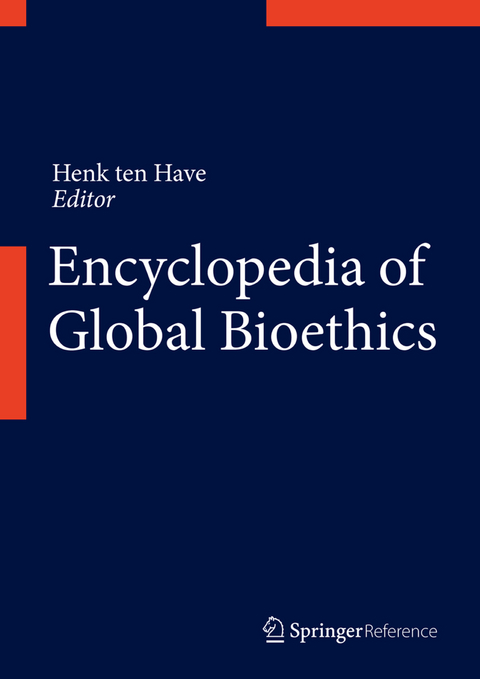
Encyclopedia of Global Bioethics
Springer International Publishing
978-3-319-09482-3 (ISBN)
Henk ten Have studied medicine and philosophy at Leiden University, the Netherlands. He received his medical degree in 1976 from Leiden University and his philosophy degree in 1983. He worked as a researcher in the Pathology Laboratory, University of Leiden (1976-1977), as a practising physician in the Municipal Health Services, City of Rotterdam (1978-1979) and as a Professor of Philosophy in the Faculty of Medicine and Faculty of Health Sciences, University of Limburg, Maastricht (1982-1991). From 1991 he was a Professor of Medical Ethics and the Director of the Department of Ethics, Philosophy and History of Medicine in the University Medical Centre Nijmegen, the Netherlands. In September 2003 he joined UNESCO as Director of the Division of Ethics of Science and Technology. Since July 2010 he is Director of the Center for Healthcare Ethics at Duquesne University in Pittsburgh, USA. QUOTE FROM REVIEWER: “There is probably no bioethicist in the world that has the same global insight in bioethics as Henk ten Have, in terms of neglected/important topics, centers of expertise around the world, qualified contributors in other countries and overall management of a project such as this one” (Jos Welie, review report on the proposal for the Encyclopedia of Global Bioethics).
lt;p>Section 1: Introduction: Global bioethics.- Section 2: Abortion.- Abuse.- Access to health care.- Addiction.- Adoption.- Advance directives.- Advance care planning.- Advertising.- Advocacy.- Ageism.- Agricultural ethics.- aids.- Alcohol(ism).- Alternative medicine.- Altruism.- Animals.- Anthropocentrism.- Anthropology and ethics.- Applied ethics.- Artificial insemination.- Artificial organs.- Artificial nutrition and hydration.- Assisted suicide.- Authenticity.- Autonomy.- Behavior modification.- Benefit-sharing.- Benefit and harm.- Biobanking.- Biocentrism.- Biodiversity.- Bioethics.- Biology.- Biometrics.- Biopiracy.- Biopolitics.- Biosafety.- Biosecurity.- Biotechnology.- Bioterrorism..- Birth control.- Body.- Brain death.- Brain drain.- Care ethics.- Capacity building.- Capital punishment.- Casuistry.- Censorship.- Children.- Chronic illness and care.- Circumcision.- Citizenship.- Civil disobedience..- Climate change and health.- Clinical ethics.- Clinical research.- Cloning.- Codes of conduct.- Coercion..- Commercialism.- Committees.- Commodification.- Common good.- Common heritage of humankind.- Communication.- Communitarian ethics.- Compassion.- Competence.- Complicity.- Confidentiality.- Conflict of interest.- Conscience.- Consent.- Corruption.- Cosmopolitanism.- Cultural diversity.- Death.- Death penalty.- Deliberation.- Dementia.- Dental ethics.- Designer babies.- Development.- Disability.- Disasters.- Disease.- Discourse ethics.- Discrimination.- Distributive justice.- DNR (Do not resuscitate policies).- Donation.- Double effect.- Dual use.- Doping.- Drugs.- Education.- Egalitarianism.- Electronic surveillance.- Electronic patient record.- Embryo.- Engineering ethics.- Enhancement.- Environmental ethics.- Epidemics.- Epidemiology.- Equality and equity.- Eugenics.- Euthanasia.- Evaluation ethics.- Evolutionary perspectives in ethics.- Exploitation.- Family medicine.- Fairness.- Feminist ethics.- Fertility control.- Fetal research.- Fetal surgery.- Fetus.- Food ethics.- Food security.- Forensic medicine.- Freedom.- Futility.- Future generation.- Gender.- Genetic counselling.- Genetic modification (GMOs).- Genetic screening.- Gene therapy.- Genomics.- Ghost writing.- Governance.- Global health.- Health.- Health education and promotion.- Health insurance.- Health policy.- Homelessness.- Homosexuality.- Honor codes.- Hospice.- Hospital.- Human dignity.- Human rights.- Human nature.- Humanism.- Humanitarian intervention.- Hunger.- Identity.- Immigration.- Implementation ethics.- Indigenous knowledge.- Indigenous rights.- Infertility.- Information technology.- Insanity.- Integrity.- Intensive care.- International law.- Internet.- Journalism ethics.- Justice.- Law.- Leadership, ethics of.- Legal ethics.- Life.- Lifestyles.- Literature.- Malpractice.- Managed care.- Maternal-fetal relationship.- Media ethics.- Mediation.- Medical humanities.- Medical tourism.- Medicine.- Mental health.- Mental illness.- Mercy.- Migratio.- Military ethics.- Mismanagement.- Mistakes, medical.- Moral pluralism.- Moral relativism.- Moral status.- Narrative ethics.- Natural law.- Nature versus nurture.- Nanotechnology.- Neonatology.- Neuroethics.- Neurotechnology.- Nongovernmental organizations (NGOs).- Non-discrimination.- Nursing ethics.- Obesity.-Occupational therapy..- Occupational safety.- Organ.- Organizational ethics.- Ownership.- Pain.- Palliative care.- Palliative sedation.- Pandemics.- Pastoral care.- Patenting.- Paternalism.- Pediatrics.- Pharmacy ethics.- Placebo.- Plagiarism.- Population ethics.- Poverty.- Precautionary principle.- Prevention.- Principlism.- Prisoners.- Privacy.- Professional ethics.- Professional-patient relationship.- Property rights.- Psychiatry ethics.- Psychosurgery.- Public debate.- Public health.- Publication ethics.- Quality of care.- Quality of life.- Refugees.- Religion and ethics.- Reproductive ethics.- Research ethics.- Research policy.- Resource allocation.- Regenerative medicine.- Respect for autonomy.- Responsibility.- Right to die.- Right to health.- Risk.-Robots.- Safety.- Science and engineering ethics.- Scientific misconduct.- Sexual ethics.- Slippery slope.- Social ethics.- Social work.- Solidarity.- Spirituality.- Sports.- Standards of care.- Stem cells.- stem cells, embryonic.- Stewardship.- Stigmatization.- Strikes.- Substance abuse.- Suffering.- Suicide.- Surrogate decision-making.- Surgery.- Sustainability.- Synthetic biology.- Technology assessment.- Testing.- Tissue engineering.- Torture.- Traditional medicine.- Transhumanism.- Transplantation medicine.- Triage.- Trust.- Truth-telling.- Utopianism.- Vaccination.- Values.- Vegetarianism.- Veterinary ethics.- Violence.- Virtue ethics.- Vulnerability.- Warfare.- Whistle-blowing.- Workplace ethics.- World ethics.-Xenotransplantation.- Section 3: Alphabetic index.
"The ten Have's Encyclopaedia represents an enormous advancement with respect to the aggressive, autarchic mainstream bioethics. ... it is certainly an 'Encyclopaedia of a more global bioethics' than any other bioethical or biomedical-ethical encyclopaedia so far." (Amir Muzur, Jahr - European Journal of Bioethics, Vol. 7 (14), 2016)
| Erscheint lt. Verlag | 29.6.2016 |
|---|---|
| Zusatzinfo | XXXVI, 3031 p. 22 illus., 11 illus. in color. In 3 volumes, not available separately. |
| Verlagsort | Cham |
| Sprache | englisch |
| Maße | 178 x 254 mm |
| Themenwelt | Geisteswissenschaften ► Philosophie ► Allgemeines / Lexika |
| Geisteswissenschaften ► Philosophie ► Ethik | |
| Schlagworte | Contemporary Global Bioethics • Emerging Global Bioethics • Medical Ethics • research ethics • UNESCO Universal Declaration on bioethics and Huma • UNESCO Universal Declaration on Bioethics and Human Rights |
| ISBN-10 | 3-319-09482-3 / 3319094823 |
| ISBN-13 | 978-3-319-09482-3 / 9783319094823 |
| Zustand | Neuware |
| Haben Sie eine Frage zum Produkt? |